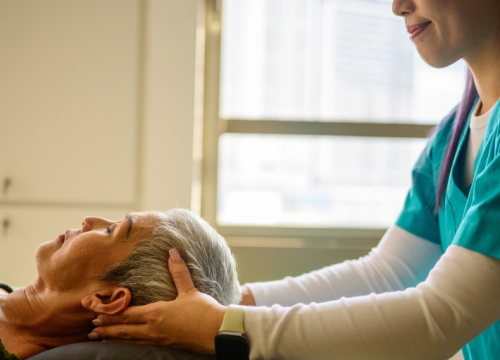Top Takeaways About Complementary Therapies and PD

People with Parkinson’s disease (PD) seeking to ease symptoms sometimes explore complementary therapies to support traditional treatments. Whether employing mindfulness to help manage pain or incorporating food as medicine, broad-ranging supplemental wellness strategies can boost well-being. Learn what to consider when exploring these therapies and how to work with your care provider for peak outcomes.
This article is based on Conversations About Complementary Therapies and PD, a Parkinson’s Foundation Expert Briefings webinar exploring treatments sometimes used together with medicine, presented by Natalie Diaz, MD, Neurology, Pacific Movement Disorders Center, Pacific Neuroscience Institute.
Up to 40% of people with Parkinson's in the U.S. incorporate complementary therapies into their self-care.
Advances in Integrative Medicine
Up to 40% of people with Parkinson's in the U.S. incorporate complementary therapies into their self-care.
There are more than 20 available prescription medications available today to treat Parkinson's symptoms. Complementary therapies are supplemental wellness products or strategies sometimes used alongside conventional medicine to alleviate the non-motor symptoms of Parkinson's, such as stress, nausea or constipation, or to improve sleep or well-being. Research shows up to 40 percent of people with Parkinson's in the U.S. incorporate complementary therapies into their self-care.
Integrative medicine — where medical providers combine traditional medicines and complementary therapies in a person's care — is also thriving. Doctors and healthcare experts can now receive board-certified integrative medicine fellowship training. A 2020 study found more than 50 percent of primary care physicians have recommended complementary therapies.
Data shows geographic differences in the use of complementary therapies. Americans tend to incorporate vitamins, dietary supplements and herbs and botanicals. Europeans and Scandinavians rely more on body-based practices, such as yoga and massage. Traditional medical systems in Asian and African countries incorporate a combination of all these practices.
There is also a socioeconomic gap in complementary therapy adoption – with people of greater incomes tending to use them. Many such treatments can be costly and are rarely covered by insurance.
Types of Complementary Therapies
- Exercises, like Tai Chi and yoga
- Vitamins and Supplements
- Acupuncture
- Meditation
- Healthy Foods
- Medical Cannabis
- And more!
Benefits of Mind-body Wellness Practices
Types of Complementary Therapies
- Exercises, like Tai Chi and yoga
- Vitamins and Supplements
- Acupuncture
- Meditation
- Healthy Foods
- Medical Cannabis
- And more!
Studies show mindfulness practice has physical and mental benefits. People with PD use mindfulness meditation to ease pain, minimize stress, increase focus and boost mood.
Other mind-body wellness practices proven to reduce stress and ease many symptoms of Parkinson's include exercises such as yoga and Tai Chi. These can lessen stiffness, increase flexibility and awareness of movement, and improve alignment, posture and core strength.
Acupuncture, where thin needles are placed at specific body points, is also sometimes used to alleviate PD pain. It's important to work with a qualified, skilled practitioner. Practitioners of reflexology, another mind-body technique, manipulate areas of a person's body to ease stress and aid digestion. As with exercise, effectiveness of these complementary therapies requires regular practice.
Making Sense of Supplements: Proceed with Caution
Despite the eagerness to incorporate supplemental strategies to live well, research shows more than half of Americans using complementary therapies don't consult their doctors before or during use. Open discussion with your care provider can uncover potentially serious side effects, prevent prescription medication interactions and ensure optimal outcomes.
Prescription medications go through rigorous U.S. Food and Drug Administration (FDA) approval processes to monitor and log potential adverse effects. However, alternative therapies such as nutritional supplements are instead regulated by the FDA as food, rather than medication. Although some companies use third-party verification to vet the supplements they sell, ingredients and dosages in over-the-counter vitamin, herb and dietary supplements can vary greatly. Be sure to seek a quality source.
Much of the science around nutritional supplements, herbs and botanicals is limited and inconclusive. Though some substances hold promise, more studies are needed.
Vitamins and supplements studied for complementary therapy by people with PD include:
- Vitamin C – antioxidants that may protect brain cells.
- Coenzyme Q10 – dosages of up to 2,400 mg daily are shown to be safe and well-tolerated, but there's currently no evidence of clinical benefits. This supplement interacts with blood thinners and aspirin. It can promote blood clotting and lower blood pressure.
- Creatine – while studies currently show no effect on PD progression or symptoms, this supplement might possibly boost mood.
- Vitamin E – one study shows this vitamin failed to stop Parkinson's progress. It can increase bleeding risk and interact with blood thinners and aspirin.
- Glutathione – studied in oral, injected and intranasal formulations to show no PD benefit.
- Omega-3 fatty acids – 1,000 mg of flaxseed oil and 400 IU vitamin E may decrease inflammatory markers and improve motor function. However, it can cause gastrointestinal and neurological side effects.
- CDP-choline (cytidine diphosphate) studies show taking 400 mg three times daily may lower levodopa dose.
- Phosphatidylcholine studies show using 100 mg three times daily can improve mood and motor function but can interact with other medications.
- Resveratrol can interact with aspirin, blood thinners and anticoagulants. It can also cause mild estrogenic activity.
- Beta carotene can cause skin pigmentation.
- Vitamin A might create nausea, dizziness and headaches.
- Vitamin B3/Niacin can bring on facial flushing and tingling.
- Vitamin D3 can lower the effect of statins and elevate blood calcium level when taken with certain diuretics.
Herbs and botanicals investigated for effectiveness in PD are:
- Gallic acid
- Ginseng
- Gingko biloba – shown to cause headache, stomach upset, palpitations and constipation, and can interact with many medications, including blood thinners.
- Curcumin, which might cause nausea or diarrhea.
- Green, black and oolong teas (camellia sinensis) can cause weight loss, nausea, rash, jitteriness or liver toxicity.
- Epigallocatechine-3-gallate (EGCG), can create dizziness and low blood sugar.
- Lion’s mane (Hericium erinaceus) can increase bleeding and interact with blood thinners.
- Milk thistle can cause abdominal bloating, diarrhea and loss of appetite. It also may lower blood sugar in people with diabetes.
- Quercetin can cause headache and nausea.
- Vincamine can cause low blood pressure, sedation and irregular heartbeat.
- Red clover can cause headache, nausea or muscle aches or estrogen-like effects including bloating, weight gain or tender breasts.
Nutritional supplements potentially useful for Parkinson's include:
- Melatonin, which may ease sleep-onset insomnia and dream enactment.
- Chamomile or passionflower – to promote sleep and ease anxiety.
- Valerian root might also promote sleep, but some people can experience headache, stomach upset and mental fog.
- Ginger may help with indigestion, but can cause heartburn and diarrhea.
- Peppermint oil might also help with indigestion.
- Flaxseed or flaxseed oil might ease constipation.
- Cranberry extract – may reduce the risk of recurrent urinary tract infections.
Mucuna Pruriens (velvet bean)
Seeds of mucuna pruriens, a legume found in tropical and subtropical areas, contain levodopa — the most powerful treatment for PD. Mucuna has been used in traditional medicine for millennia for a number of medical conditions. It's thought to have anti-inflammatory properties and may benefit diabetes.
It also might work as an antidepressant and has been documented in ancient texts to help what sounds like Parkinson's. A few studies compare this legume to traditional levodopa, however, more research is needed to explore its safety and long-term side-effects.
Cannabinoids
Cannabinoids are one group of hundreds of substances found in the cannabis sativa plant, known when dried as marijuana. There are more than 100 known cannabinoids.
Tetrahydrocannabinol (THC) is known for its psychoactive euphoric effects. Cannabidiol (CBD), another psychoactive, is associated with calming effects.
Medical marijuana is now legalized in more than 30 states, while recreational marijuana is legal in 15 states. Small studies have shown cannabis might have potential to ease some PD symptoms — such as anxiety, sleep disturbances, pain or gastrointestinal issues — but more research is needed to determine if there is any medical benefit.
Safety issues from use include potential medication interactions, delayed absorption and effects from edibles, and dangers of lung injuries from vaping. Side effects can also include low blood pressure, fatigue, dizziness, mood or cognitive changes, changes in balance, hallucinations and changes in weight.
The lack of quality control across products also has its dangers. No governing body regulates cannabinoid quality or labelling accuracy. Products can be contaminated with microorganisms, pesticides or other substances. Like nutritional supplements, studies show cannabinoid content differs between manufacturers and deviates from the label.
The Takeaway
Complementary therapies often focus on treating the whole person, rather than symptoms alone. They can inspire a sense of wellness or empowerment. Some therapies have even shown promise in Parkinson's studies, but research is still in the initial stages.
Discuss the pros and cons of any complementary therapy with your care team before beginning. When incorporating complementary therapies, only change one thing at a time. Monitor your progress. Noticeable changes can take time — give it anywhere from a few weeks to a month.
Explore the nonprofit U.S. Pharmacopeia (USP) scientific organization to discover supplement manufacturers who participate in USP's dietary supplement verification program. ConsumerLab.com also independently tests vitamins and nutritional supplements for quality and labelling accuracy.
Looking to amplify your wellness from home? The Parkinson's Foundation has everything you need to live better today. Join us weekly for PD Health @ Home.
Related Blog Posts

10 Tips for Playing Pickleball to Stay Active with Parkinson’s

